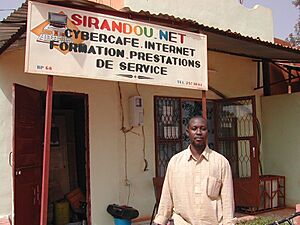Ministry of Foreign Affairs (Netherlands) facts for kids
 |
|
| Ministry overview | |
|---|---|
| Formed | 12 March 1798 |
| Jurisdiction | Kingdom of the Netherlands |
| Headquarters | Rijnstraat 8, The Hague |
| Employees | 3,000 |
| Annual budget | €13 billion (2023) |
| Minister responsible |
|
| Deputy Minister responsible |
|
| Ministry executive |
|
| Website | Ministry of Foreign Affairs |
The Ministry of Foreign Affairs (also known as BZ) is a special part of the Dutch government. It handles how the Netherlands talks and works with other countries around the world. Think of it as the team that helps the Netherlands be a good friend and partner to other nations.
This ministry is in charge of many important things. It looks after foreign policy, which means deciding how the Netherlands acts on the world stage. It also helps with international development, which is about helping poorer countries grow. Plus, it deals with international trade and matters related to big groups like the European Union, NATO, and the Benelux Union.
The ministry started a long time ago, in 1798. Back then, it was called the Department of Foreign Affairs. In 1876, it officially became the Ministry of Foreign Affairs. The main leader of the ministry is the Minister of Foreign Affairs. This person is a member of the Dutch government's main team, called the cabinet of the Netherlands. Currently, Caspar Veldkamp is the Minister. There is also another minister who helps, called the Minister for Foreign Trade and Development Aid. This role is currently held by Reinette Klever.
Contents
How the Ministry Started
The Ministry of Foreign Affairs began in 1798. It was first known as the Department of Foreign Affairs. Since 1965, most governments have had a special Minister for International Development. This minister focuses on helping other countries.
What the Ministry Does
The Ministry of Foreign Affairs has many important jobs. It helps the Netherlands connect with countries all over the world. Here are some of its main tasks:
- It keeps good relationships with other countries and international groups.
- It works to make countries cooperate and help each other.
- It helps developing countries grow their societies and economies. This is done through international cooperation.
- It protects the interests of Dutch citizens and the Netherlands when they are abroad.
- It gathers information about other countries and world events. This helps the Dutch government make good decisions.
- It shares information about Dutch policies and views on global issues.
- It shows the world what the Netherlands is like.
- It handles requests and problems for foreigners in the Netherlands. This includes people wanting to enter or leave the country.
How the Ministry is Organized
The Minister of Foreign Affairs and the Minister for Foreign Trade and Development Cooperation lead the ministry. The ministry has four main departments, called directorates-general. Each department focuses on a different area:
- The Directorate-General for Political Affairs deals with peace, safety, and human rights. This includes the European Union's foreign policy. It also covers the role of NATO and the United Nations. This department guides Dutch embassies around the world.
- The Directorate-General for European Cooperation focuses on the European Union. It manages the Netherlands' relationships with EU countries. It also works with other groups like the Council of Europe and the Benelux.
- The Directorate-General for International Cooperation is in charge of helping developing countries. The Netherlands focuses on four main areas for this help: water, safety and fair laws, food security, and health rights.
- The Directorate-General for Foreign Economic Relations helps Dutch businesses succeed in other countries. It also helps shape how the Netherlands contributes to the global economy.
The Netherlands has about 140 diplomatic offices in other countries. These are like small Dutch outposts around the world.
Helping Through Technology
The International Institute for Communication and Development (IICD) was a group started by the Ministry in 1996. Its goal was to help countries grow by using technology. This included computers and the internet.
The IICD was based in The Hague, Netherlands. It worked in nine developing countries. These included Bolivia, Ghana, Jamaica, and Mali. The IICD helped with projects that used technology in areas like health and education. It also helped with farming and good government. The IICD received money from the Netherlands and other countries. The IICD stopped its work on December 31, 2015.
See Also
- Minister of Foreign Affairs of the Netherlands
 | Kyle Baker |
 | Joseph Yoakum |
 | Laura Wheeler Waring |
 | Henry Ossawa Tanner |


